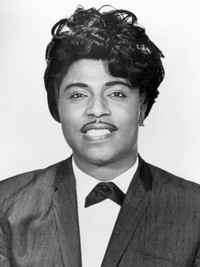Little Richard

Richard Penniman a/k/a Little Richard was a rock & roll legend and one of its originators. Born in Macon GA, he grew up in a highly religious family; his father was both a church deacon and a whiskey bootlegger. This exemplified the push-and-pull between the sacred and sensual world, which would become a recurring theme in Richard's life. As a young performer he had experience in both fields. In Macon he was employed to sell refreshments at shows; this led to his befriending gospel legend Sister Rosetta Tharpe and giving his first paid performance with her at age 14. He learned piano around this time, taking a cue from Ike Turner's pounding keyboard on "Rocket 88." By 1949 he'd dropped out of tenth grade to perform with a travelling medicine show. Here he first encountered the flamboyant showmen who performed in drag; Richard adopted this and the winking sexual ambiguity would become key to his persona-and a barrier breaker in the mainstream music world. Richard's first recordings were for RCA in 1953 and in more of a jump-blues vein; there weren't hits outside of Georgia. Two years later he auditioned for the Specialty label at singer Lloyd Price's suggestion; he was signed and brought to New Orleans to record. He chose the innuendo-heavy song "Tutti Frutti" which he'd performed on the road; songwriter Dorothy LaBostrie was brought in to sanitize the lyrics. Both this and the followup "Long Tall Sally" were chart-toppers and became rock & roll classics. Richard was now a full-fledged rock & roll star, drawing screaming girls at his concerts despite the gay subtext. The next two years brought a string of further hits-"Rip It Up", "Lucille," "Keep A-Knockin'", "Good Golly Miss Molly" and "The Girl Can't Help It" (the title song to one of the first notable rock movies)-each of them a rock & roll cornerstone. Faced with numerous personal stresses-the racism he encountered on tour, royalty conflicts with Specialty, and a short-lived marriage-he retired from rock for the first time in late 1957. He studied theology at Oakwood College in Huntsville, Alabama, and for the next four years made only gospel records, singing in a baritone voice entirely different from his rock vocals. In 1962 he toured England, but when audiences began booing his all-gospel sets he impulsively began doing the rock & roll hits instead. This led to a triumphant comeback tour in the UK, which partly included the Beatles as opening act (They would cover many of his songs after becoming stars). He returned to recording rock though scored only one minor hit, 1965's "I Don't Know What You've Got (But It's Got Me)"-notable mainly for featuring guitarist Jimi Hendrix, who played in Richard's band before going solo. Despite stays with various labels including Warner/Reprise in the '70s, Richard never returned to the charts. But he remained a beloved entertainer for decades to come, making frequent TV appearances, touring often, and moving into movies. In 1986 he appeared in Paul Mazursky's comedy "Down and Out in Beverly Hills," scoring a soundtrack hit with "Great Gosh A-Mighty" (written and produced by his one-time protégé Billy Preston). In 1991 he even recorded a children's album for Disney. Multiple health problems including a heart attack and hip replacement surgery led to his retiring in 2013; in 2019 there was a movement underway to install a statue in Macon while he is still alive. Little Richard, who was known to have been in ill health for several years, died of boine cancer on May 9, 1987. He was 87.